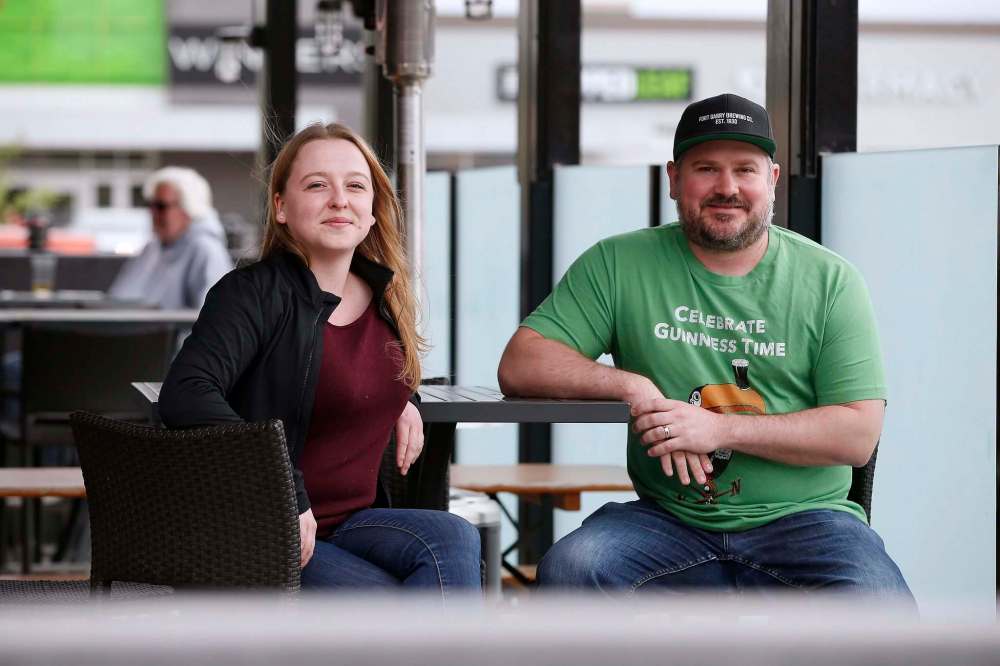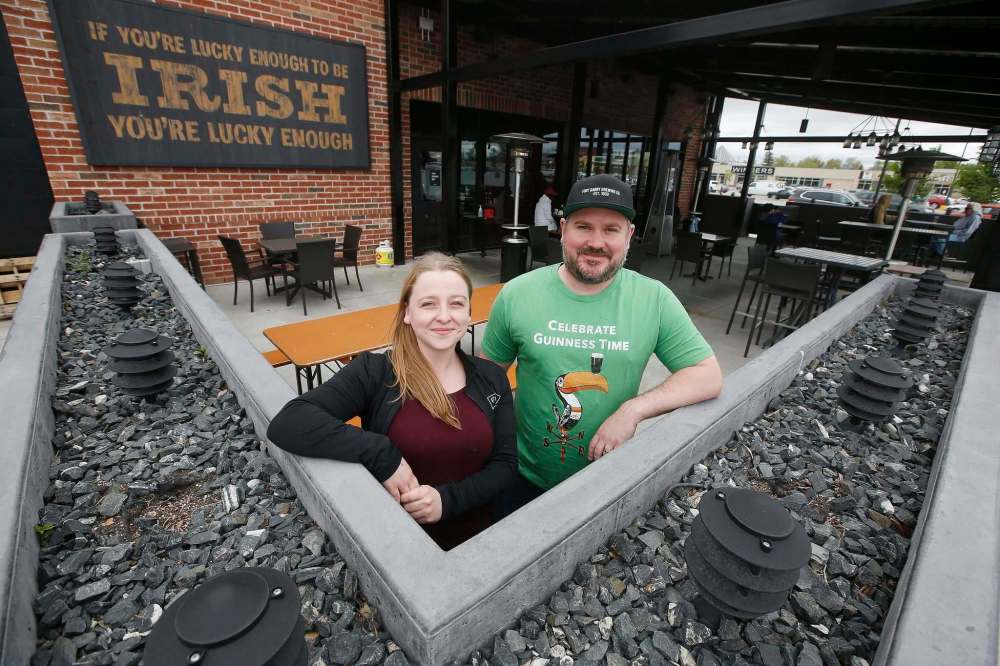Above and beyond As service workers deal with new safety measures, how should customers show their appreciation?
Read this article for free:
or
Already have an account? Log in here »
To continue reading, please subscribe:
Monthly Digital Subscription
$19 $0 for the first 4 weeks*
- Enjoy unlimited reading on winnipegfreepress.com
- Read the E-Edition, our digital replica newspaper
- Access News Break, our award-winning app
- Play interactive puzzles
*No charge for 4 weeks then billed as $19 every four weeks (new subscribers and qualified returning subscribers only). Cancel anytime.
Read unlimited articles for free today:
or
Already have an account? Log in here »
Hey there, time traveller!
This article was published 31/05/2020 (1419 days ago), so information in it may no longer be current.
Amid the coronavirus crisis, the new normal has brought with it new protocols, new procedures and new anxieties for service-based businesses.
Everyone from the server on the patio to the hairstylist behind the chair is figuring out how best to provide excellent service while also keeping themselves and others safe. The public, meanwhile, has been leaning harder on curb-side pickup and delivery during the age of isolation.
All of this raises the question: what’s the etiquette around tipping during a pandemic?
First, it’s useful to consider why we tip in the first place.

“I have a bit more contemporary economic perspective on tipping,” says Lisa Orr, a Toronto-based etiquette and protocol consultant. “Tipping used to be something that existed because fair wages didn’t exist. As someone in the etiquette/civility space, my preference would be moving towards a place where tipping isn’t required. If we get to a place where there isn’t tipping, that means we’ve moved to a place where people are earning fair wages for the work they’re assigned.”
Orr points out that we don’t tip dentists, lawyers, or doctors. “There’s all these professional services we don’t tip, but we do tip in the areas of personal services,” she says. “The idea is it was meant to reward people for doing exceptional service in those areas where they aren’t being compensated adequately through their regular wage. I think that still exists today, unfortunately.”
During a pandemic, however, tipping can take on an added significance. It’s not just about rewarding good service, it’s also about recognizing all the extra safety precautions — and risks — service providers are taking.
With that in mind, should people be tipping more during a pandemic?
“If we get to a place where there isn’t tipping, that means we’ve moved to a place where people are earning fair wages for the work they’re assigned.” – Lisa Orr
“During this time when delivering personal services is riskier and more challenging, I think it’s worthwhile to consider tipping more if you can,” Orr says. “People who are delivering personal services, those who can right now, are really taking additional risks and going out of their way to make it possible for others not to have to go outside and do things.”
Orr says tipping more isn’t mandatory and people shouldn’t feel pressured to do it. “It doesn’t have to be dramatically different, but if you can tip a little bit more, I think it makes a difference,” she says. “If all of us tipped a little bit more, that makes it a little more remunerative for the people who are taking those risks to help us.”
Jay Kilgour is the franchisee and general manager of Fionn’s Grant Park and Fionn MacCool’s Crossroads. Since reopening the Grant Park location’s patio at the beginning of May, he and his staff are operating from a “safety first” position.
“We’ve had to be very versatile and change according to our guests’ needs, but make changes according to safety,” he says. “Since the start, safety’s always been the first priority, and there’s a lot more procedures — and a lot more stress, quite frankly — just because we can’t compromise on that stuff and it’s got to be done right.”
“During this time when delivering personal services is riskier and more challenging, I think it’s worthwhile to consider tipping more if you can.” – Lisa Orr
Still, Kilgour isn’t sure that the added pressure means guests should tip above and beyond what they normally would.
“If you’re financially able to, and you want to, great,” he says. “But at the end of the day, these extra measures have just become part of our new reality as what our job is. At the same time, there have been lots of people who have been very, very generous, and it’s been greatly appreciated.”
Kilgour points out that many people are already stretching their personal restaurant budgets to help support local eateries during an uncertain time. “You’d be playing a dangerous game if you were expecting people to tip outside their means,” he says.
Who gets a tip?
Tipping etiquette can be murky at the best if times. Do you tip fast-food workers? What about delivery drivers? Do you tip when you’re picking up an order from a restaurant?
During a pandemic, it’s even less clear. At the beginning of the coronavirus crisis, for example, many people wanted to tip grocery-store cashiers and other service providers who fall outside the usual tipping circle.
“Whether its a dishwasher showing up to work or a server showing up to work or a host, everyone is taking the same risks and everyone’s helping each other out in different ways. For the first time, and I’ve been in this industry for about 15 years, we tip-pool and it’s getting divvied up evenly, no matter what position you work.” – Jay Kilgour
“This is where I would encourage retailers to make it easier for people to recognize good service,” Orr says. “For example, pre-pandemic, we were moving fairly quickly towards cashless, but you could still leave a few dollars. Whereas in this age, no one wants your dollars, no one wants to touch your cash. I think there’s some responsibility on retailers and different service providers to find ways to make it easier for people who are engaging and want to find ways to recognize service, for example using curb-side pickup, who want to say an extra thank you.
“We also get some trust in our retailers that if there are gratuities, that they’re going to make sure those are given to the employees. That’s also been an issue of concern, so I think that’s a real opportunity for retailers to explain how they’re going to manage their tipping policy if they’re going to put those things in place.”
Fionn’s, for its part, is currently tip-pooling. “Whether its a dishwasher showing up to work or a server showing up to work or a host, everyone is taking the same risks and everyone’s helping each other out in different ways,” Kilgour says. “For the first time, and I’ve been in this industry for about 15 years, we tip-pool and it’s getting divvied up evenly, no matter what position you work.”

It’s also important to remember that expressions of gratitude and recognition of a job well done do not have to be monetary — especially as many Canadians grapple with layoffs and wage reductions. Sending a note or letter, giving kudos on social media, leaving a positive review, recommending the business or service to others, and telling people that you really appreciated their help today are all easy and free options that can go a long way in making people feel valued.
“There’s a lot of negativity out there,” Orr says. “There’s a lot of, ‘This store isn’t doing this the right way’ and ‘This person isn’t doing that the right way.’ But there are a lot of places doing a lot of things right. And I think by finding ways to acknowledge them, or continuing to send your business to them, it helps.”
Patrons may also have to expand their definition of what “good service” looks like and adjust their expectations accordingly. Speed, for example, is often considered a valuable trait at restaurants. At Fionn’s, it was policy to have a drink in front of people within four minutes of them sitting, but if Kilgour had to choose between getting a drink on the table and sanitizing the table properly, “we’re going to choose sanitizing the table properly every time.”
To that end, Kilgour says the best way to appreciate hospitality staff right now is through kindness and patience.
“I would say that’s even more important than tipping,” he says. “Kindness and patience towards the battle everyone is fighting go much further than the actual monetary tip because every day, I have new staff starting — and I’ve been lucky enough that we’re in a position to bring back almost every single employee we’ve laid off — but the reality is, they’re walking into an unknown and things aren’t the same, so there’s going to be a definitely learning curve for general hospitality and the way the industry works.”
jen.zoratti@freepress.mb.ca
Twitter: @JenZoratti

Jen Zoratti
Columnist
Jen Zoratti is a Winnipeg Free Press columnist and author of the newsletter, NEXT, a weekly look towards a post-pandemic future.







